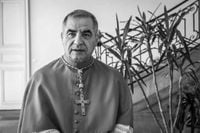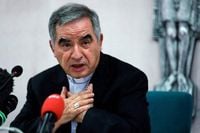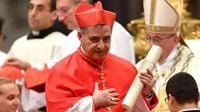Cardinal Angelo Becciu, the former deputy Secretary of State who was stripped of his cardinal privileges due to embezzlement charges, has officially announced his withdrawal from the upcoming papal conclave, scheduled to begin on May 7, 2025. This decision follows a dramatic series of events that have captivated Vatican observers and raised questions about the integrity of the conclave itself.
Becciu's withdrawal, reported by Italian media on April 28, comes after a tumultuous history marked by serious allegations of financial misconduct. In September 2020, Becciu resigned from his position as prefect of the Dicastery for the Causes of Saints and relinquished his cardinal privileges after being accused of embezzlement and nepotism. His trial commenced in 2021, culminating in a guilty verdict in December 2023, where he was sentenced to five and a half years in prison, fined 8,000 euros, and disqualified from holding public office in the Vatican.
Despite these convictions, Becciu had recently argued for his right to participate in the conclave, claiming that he had received a message from the late Pope Francis suggesting a potential resolution to his situation. In a private conversation in January 2025, Becciu stated, "I think I have found a solution," indicating that he believed he could still vote. However, this assertion was met with skepticism among the cardinals.
During the fifth general congregation of cardinals on April 28, 2025, the conclave's date was confirmed, and discussions turned to Becciu's eligibility. Cardinal Giovanni Battista Re, the dean of the College of Cardinals, reportedly expressed support for Becciu's participation, while Cardinal Kevin Farrell asserted that Pope Francis had intended for Becciu to be excluded. This division among the cardinals highlighted the contentious nature of Becciu's situation.
Adding to the complexity, Cardinal Pietro Parolin, the Vatican Secretary of State, confronted Becciu, presenting him with two letters signed by Pope Francis that indicated his exclusion from the conclave. One letter dated back to 2023 and the other to March 2025. Reports suggest that Becciu was not privy to the contents of these letters, which were purportedly signed with the initial "F" as the pope's health declined.
Ultimately, during the morning general congregation, Becciu announced his decision to withdraw, stating that he was doing so for the good of the Church and its unity. This emotional moment was described as him "almost in tears" as he recognized the need to step back from his claim to participate. Vatican spokesman Matteo Bruni confirmed that the issue had not been formally deliberated in the morning session, but Becciu's announcement effectively resolved the controversy.
Becciu's case is not the only one raising eyebrows ahead of the conclave. There are ongoing concerns regarding the eligibility of other cardinals, particularly those who have reached the age limit of 80, which disqualifies them from voting. For instance, Cardinal Philippe Ouédraogo of Burkina Faso recently changed his birth date to avoid this restriction, leading to questions about the ethics of such actions.
As the conclave approaches, the Vatican has not yet confirmed the final number of cardinal-electors who will participate. The necessity for a clear and undistracted election process has never been more critical, especially following the death of Pope Francis on April 21, 2025. His passing has left a significant void in the Church, and many hope for a smooth transition to new leadership.
In addition to Becciu's withdrawal, reports indicate that several cardinals have opted out of the conclave due to health concerns, further complicating the electoral landscape. The situation reflects the broader challenges facing the Catholic Church as it navigates a period of uncertainty and potential change.
In conclusion, Cardinal Becciu's decision to withdraw marks a significant moment in the lead-up to the papal conclave. His case has highlighted the complexities and controversies surrounding cardinal eligibility and the ongoing efforts within the Church to maintain integrity during this pivotal transition. As the cardinals prepare to elect a new pope, the focus will now shift to the future direction of the Catholic Church and the leadership that will guide it in the coming years.



